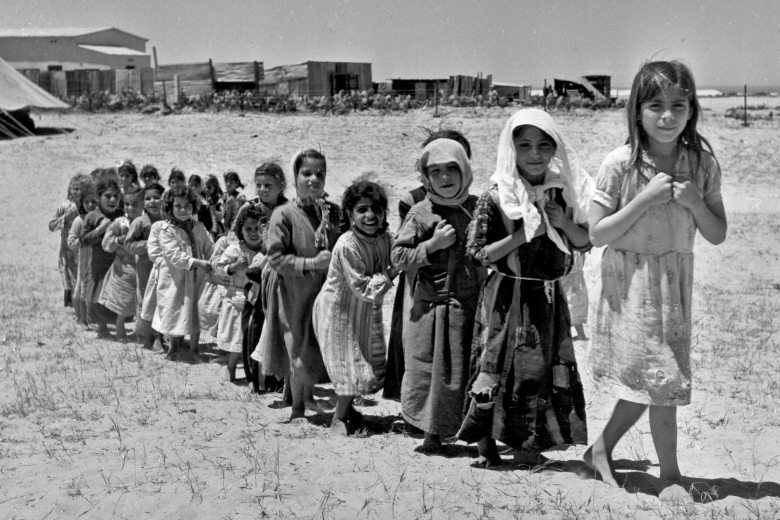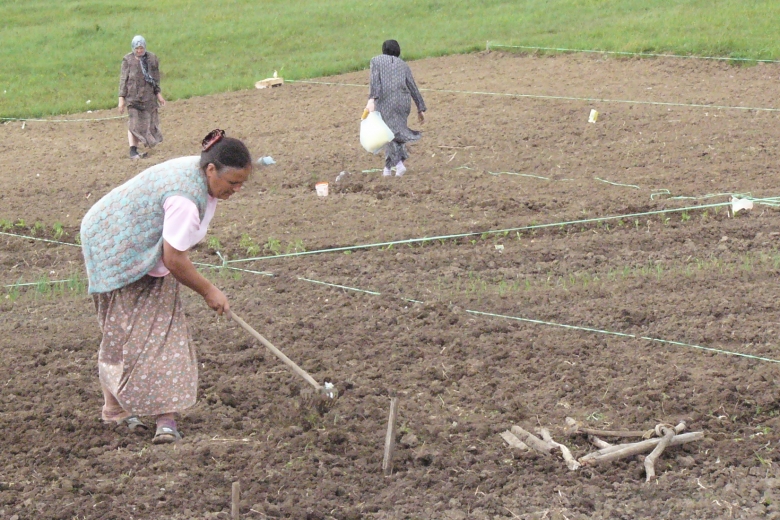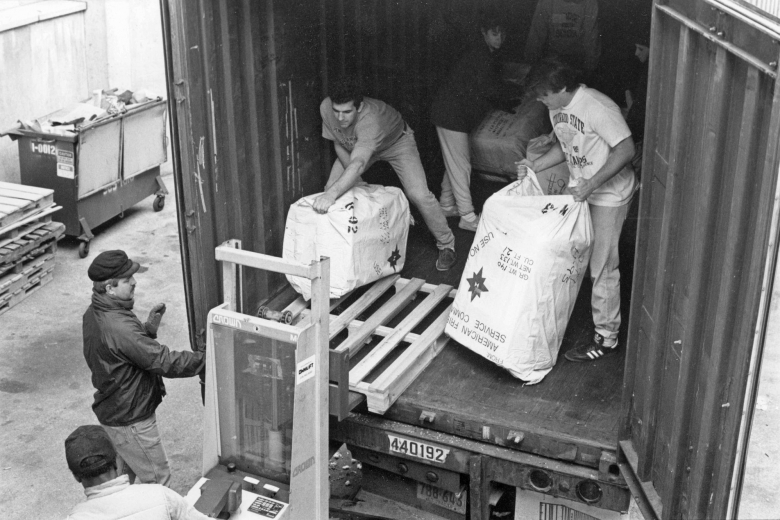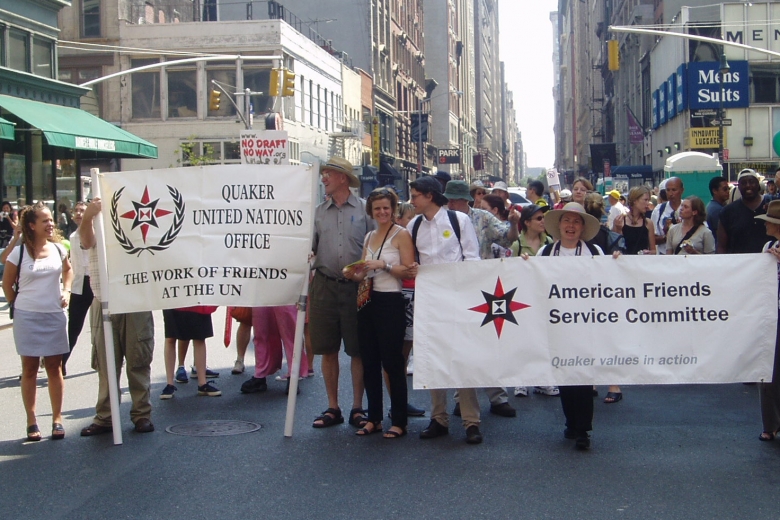Courageous & Generous Acts
In 1934, in Germany, my tranquil childhood was invaded by fear. My teacher donned the Nazi uniform and stopped greeting me or calling on me in class. I was the target of stone throwing and name calling every day on the way to school; my friends would not play with me anymore; no more swimming because, inexplicably, Jews were no longer allowed in the village pond. My fear increased when my oldest sister was sent to a boarding school in Italy. Would my younger sister and I also have to leave my parents, be sent away? When the Nazis beat up my Uncle and he fled to England, I worried. Would my father also be thrashed?
The day came when neither my sister nor I were allowed to attend school. We spent our days cleaning up the garbage that had been tossed into our garden and the graffiti painted on the fence.
My father was a decorated officer of the First World War, my mother was a Red Cross nurse; undoubtedly both remembered the postwar Quaker feeding in Germany. They also were grateful that the Quakers protested in 1931, when the Nazis publicly and loudly demonstrated their anti-Semitism. From the Friends’ office in Bad Pyrmont my parents learned about a fledgling Quaker boarding school, Eerde, in Holland, supported by British, Dutch and German Friends and later by the American Friends Service Committee. My father enthusiastically endorsed this school for religious and political refugee children. He paid the tuition for numerous children whose parents were in prison or had been murdered.
For the school Friends had rented an ancient castle, with an inner and outer moat, located deep in an old oak forest, an idyllic location, a tranquil haven. My mother and father wanted their nine-year old daughter to be safe and to receive an education. In 1936 they decided to send me to the Quaker School Eerde, on the train, alone, trusting that Friends would meet me once I arrived in Holland.
I was absorbed into this remarkable community, which was grounded in the silent Meeting. Many tears were shed in the silence as attendees mourned the death of parents in concentration camp and the execution of loved ones. We cried under our blankets at night and woke up to pre-breakfast gymnastics to face another day. We hugged, and shared the pain of our losses and had enough energy to study, to play and to find solace in music, poetry and nature.
At Eerde I met Peter and Dody Elkinton, students at the school and son and daughter of Howard and Catherine. Howard and Catherine were working as representatives for the American Friends Service Committee in Germany, a dangerous and courageous undertaking. Their effort was directed at helping both persecuted Jews and non-Aryans, to leave Germany.
After Kristallnacht (Crystal Night), November 9-10, 1938, and time in Buchenwald concentration camp, my father arrived in Holland, gaunt, his head shaved, but alive. It is possible that Howard Elkinton was instrumental in obtaining his release.
My parents, as many Jews, had bought tickets to the farthest point on the globe when they were in Germany and still had some money. These tickets, our escape route, were confiscated and canceled by the Nazis, and my parents had no money to buy new tickets. The American Friends Service Committee paid the Hamburg America Line for our canceled tickets, as well as for
those of other refugees who faced the same dilemma. If it were not for this generous act, we never could have boarded the Rotterdam, a cargo ship overcrowded with refugees, in November of 1939. My family never would have been able to sail to the United States.
In spite of the sad and grim leave-taking from Holland, and the fear that our ship would hit a mine in the English channel, like the refugee ship the Simon Bolivar had done a week earlier, we had to laugh. In the crowded waiting room we met Edna and Homer Morris, who had been working in Poland and Lithuania for the Service Committee, proudly wearing the Service Committee red white and black star and reeking of whisky. A well-wisher had given Edna a bottle
and in all the jostling in the ship’s boarding area, it had fallen and broken, soaking both Edna and Homer with its precious content.
In November of 1939, when, after a stormy and long crossing, we arrived in
Hoboken, NJ, my father had a job representing a Belgium linen firm in the United States. The very day he received his first big order from Macy’s department store for table linens, the German Army invaded Belgium. The order was never delivered, my father was without work or money to support his family. Once again Friends came to the rescue. James and Ruth Vail asked my mother, a nurse, to live in their home in Media, PA, and take care of Mother Vail, who was frail and aging. The Service Committee tried to find employment for my father at Pen Craft in Maine, a community of hand crafters the Committee supported. Friends did not abandon my family once we faced the difficulties of adjusting to a new home as strangers, with no money and limited language skills.
At the same time two families at Westtown School volunteered to host my sisters and me. My younger sister and I lived with Russell and Mae J.Edgerton, my older sister with RobertTomilson and his wife. We were allowed to attend classes at the school. My two sisters left Westtown once my father found a job and earned enough to rent an apartment; I was allowed to stay on thanks to donations for my tuition from numerous individual Friends and from the Service Committee.
There was much that was different between Eerde and Westtown: the strict separation of boys and girls at my new school, the lack of awareness of what was happening in Europe on the part of my peers, and minor matters, such as green jello, which my sisters and I were sure was poisonous. Master Russell and Mae J. Edgerton were infinitely patient in explaining the mysteries of the English language to me. Without them I would not have known that there was
a garden hose as well as hose ladies wear to meeting. When I was desperate because my friends,my classmates who had been left at Eerde, died in concentration camp, Mae J. and Russellcomforted me. The Westtown community supplied me with more clothes than I had ever owned and found jobs, (washing socks and dishes) I could perform to earn pocket money. Eventually, Teacher Rachel Letchworth helped me find scholarships to make it possible for me to attend college.
While my father was looking for work, he lived in a rooming house in New York.
When he still had his weaving mill in Germany, one of his business friends took a beloved Meissen lobster platter for him to the United States. When we arrived in the U.S. the friend returned the platter to my father and James and Ruth Vail bought it and displayed it in their dining room. With the cash he received for the china, my father paid his room rent in New York. Once a steady job and income made it possible, James and Ruth let my family
buy back the platter for the same amount they had paid when they purchased it. What a respectful way to treat someone unemployed and out of money.
In November of 1940 Homer and Edna Morris told us they were going to be with their daughter over the Thanksgiving Holiday, and offered us their home. This was our first Thanksgiving in the United States and we only had a vague notion of the meaning of this festival. We hardly knew enough English to understand the invitation.
My two sisters, my parents and I met at the train station in Media and were astonished to find a neighbor of our host at the station with a car. He drove us through a beautiful wooded area to our temporary home, which was decorated with welcome signs. Directions were attached to all the appliances, along with telephone numbers of the neighbors, who would be available to help us if we could not get the toaster or oven to work. We were overwhelmed and felt as if we had just been led into paradise. There was a bit of snow on the ground and the weather was cold, but we were snug and cozy, warmed not only by the fire in the fireplace, but by the generosity of our friends. The refrigerator was full and our instructions were to use whatever we needed. Early Thanksgiving morning, to our surprise, several neighbors rang our doorbell. They brought a roasted turkey and all the trimmings of a Thanksgiving dinner. They wanted us to know what Americans eat on Thanksgiving Day. They listed for us the ingredients necessary to bake sweet potato, pumpkin and mince pie, food we had never seen nor tasted. They told us about the pilgrims and their travail.
Our dinner conversation, that first Thanksgiving, reflected our deep gratitude that we had survived the Holocaust. That we could sit down, under one roof, as a family, and enjoy delicious food. We were deeply grateful for the help we had received from innumerable people, from strangers, who had put their own lives at risk and from the American Friends Service Committee and Friends. What occupied our thoughts was the extremes of the human spirit that we had experienced; the unbelievable brutality of the Nazis, and the loving generosity of our friends. We discussed until late into the night whether we, as human beings, would ever find an effective method to bridle our cruel and aggressive impulses, and let the generous spirit, which we also possess, prevail.
Eventually my father found a job in Boston. His salesmanship was soon rewarded; he earned good commissions and was promoted. Between my Mother and Father’s combined salaries they were able to afford a small unfurnished apartment. My parents were reunited years after landing in Hoboken, a long, difficult journey. They were deeply grateful for the help they had received and also that, once again, they were able to give help to those who needed it.
We tried to analyze, to understand, why Friends, in contrast to other citizens, made us feel welcome, helped us repeatedly when we faced inevitable difficulties. Others considered us ‘enemy aliens’ because we came from Germany, and many, in the 1940s in New England, freely expressed their dislike of Jews.
As an adult I had the privilege to attend the 1982 New York City protest against nuclear arms, as well as to join the American Friends Service Committee on a trip to Haiti. In Haiti we celebrated the opening of the clinic in Grand Anse in Dame Marie.
The work the American Friends Service Committee and its dedicated volunteers do and have done around the world is a flicker of hope amongst all the violence and cruelty we inflict on each other every day. Let us support the work of the American Friends Service Committee with ever more courage and enthusiasm for the next one hundred years.





